How Ebon Moss-Bachrach Gave The Bear Some Teeth
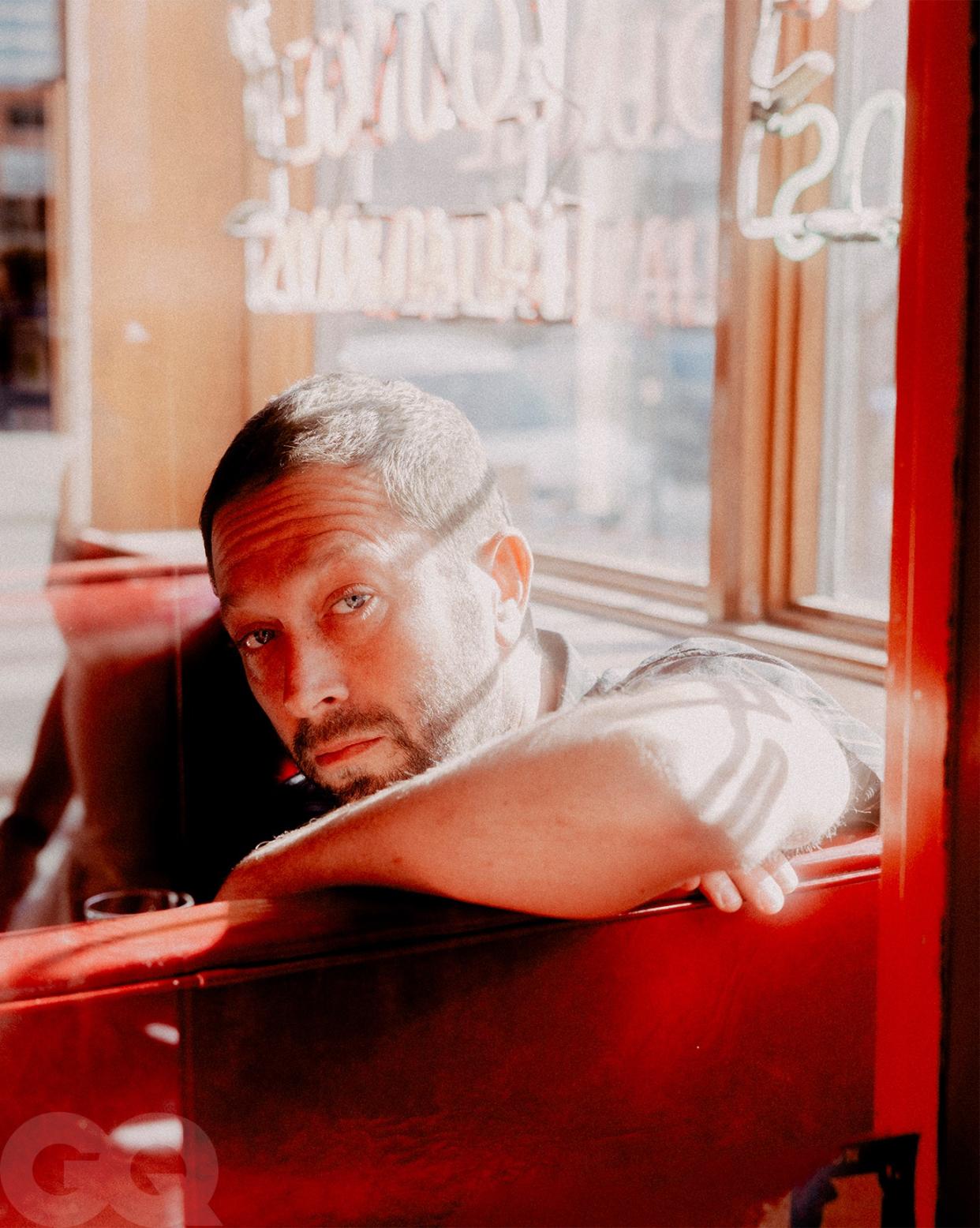
- Oops!Something went wrong.Please try again later.
- Oops!Something went wrong.Please try again later.
I’m looking around for Ebon Moss-Bachrach in Brooklyn’s Cobble Hill Park when a memory hits me. The last time I was in this particular spot—tucked away from the rest of Brooklyn, more of a village green than a playground—it was the early aughts, I was 24, and my old roommate was meeting up with his coke dealer. I just stood to the side and watched, feeling sort of cool to be involved.
When Moss-Bachrach—a recent Emmy winner for his portrayal, on FX’s The Bear, of Richie, the irascible lost soul you can’t help but feel pangs of hope for—appears on the far side of the park, he’s a black spot—black hoodie, black jeans, black Chuck Taylors. I remember that my roommate, the dealer, and I were all dressed the same way. And maybe because Moss-Bachrach’s done such a great job playing a charming dirtbag underdog on the show, one of the first things I say to him is how I can’t help but feel a little strange and out-of-place being back in this same park decades later, in what’s now a posh pocket of Brooklyn, because 20 years ago I accompanied somebody to the same spot on a drug buy, just a few feet from where I’m now watching a group of kids probably named Kale and Sufjan draw smiley faces on the red brick walkway with pastel-colored chalk.
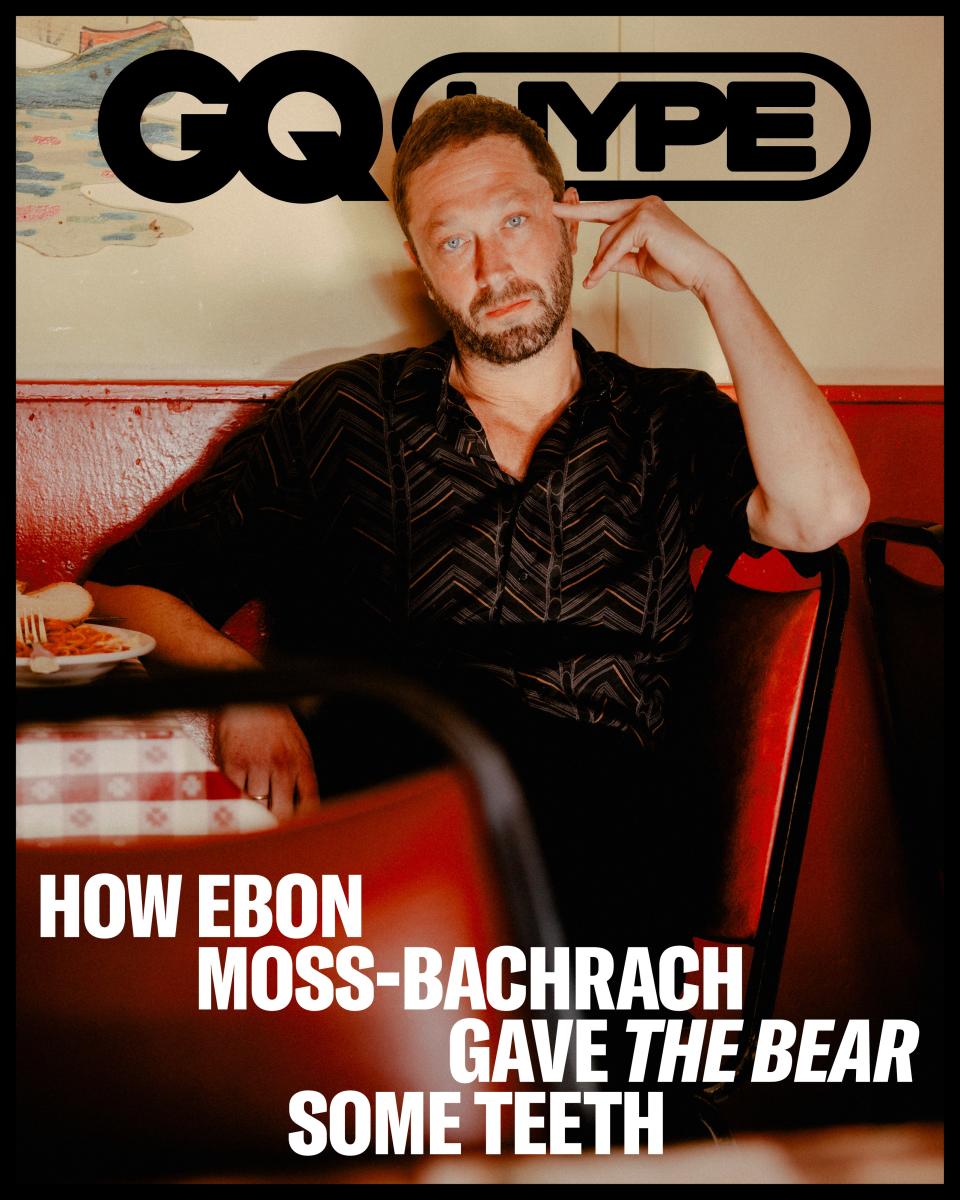
I expect Moss-Bachrach to tell me “That’s cool” or share a similar story of his own good old days as a Brooklyn wastoid. Just a couple of 40-something dudes recalling the way they used to be. Moss-Bachrach quickly extinguishes that notion.
“You’re wearing a Barbour jacket, bro,” Moss-Bachrach points out. “I think you’re good.”
Moss-Bachrach’s bringing me back to earth by reminding me that I wasn’t exactly living the rock and roll lifestyle then and I’m certainly not now served as a funny introduction. I don’t bother trying to redeem myself by saying that the Barbour is vintage, that I got it at a tag sale for 30 bucks. Still, somewhere over the next two hours and a solid three-and-a-half miles as we walk from Cobble Hill to Williamsburg, where the actor is picking up a bike that’s being repaired, it dawns on me that there’s a metaphor in our initial interaction. It just takes me a little while to figure it out.
When I told a friend I was speaking with Moss-Bachrach, she mentioned seeing him around Williamsburg in the early 2000s. “He was the guy who was actually in a Wes Anderson movie and wasn’t trying to dress like it,” she told me, blowing my mind. I recalled rumors of somebody who’d played a small part in Anderson’s whimsical universe living among the rest of us normals way back when, but I’d never put it together. And that’s fair: Frederick the Bellboy, Moss-Bachrach’s part in 2001’s The Royal Tenenbaums, wasn’t exactly a star-making role, but it was one of his earliest, and working with a legend like Hackman was a highlight.
“He’s a pro. He didn’t really rehearse” is how Moss-Bachrach remembers Hackman. “The guy who had been his stand-in for, I think decades at that point, had a Gene Hackman–esque kind of personality—at some point, he looks at me and goes, ‘I fucking hate shooting in New York. There’s no decent restaurants in this fucking town.’”
Moss-Bachrach was in two other films that came out in 2001, the same year as Tenenbaums, and three more two years later in 2003, including a starring role in the Damon Dash–directed rap music satire Death of a Dynasty, which is nowhere as famous as you’d expect from a movie with cameos by Jay-Z, Chloë Sevigny, and Mariah Carey. But when you look at Moss-Bachrach’s filmography, you notice that for nearly a decade he was a three-film-a-year guy with the occasional TV gig (including a Dick Wolf Triple Crown—parts on Law & Order: Criminal Intent, Special Victims Unit, and Trial by Jury.) He was a working actor, happy to be able to pay the bills. Then, in 2014, he went from being the guy people in Williamsburg knew as somebody who’d been in a Wes Anderson movie to being the guy who lived in the neighborhood and appeared on Girls.
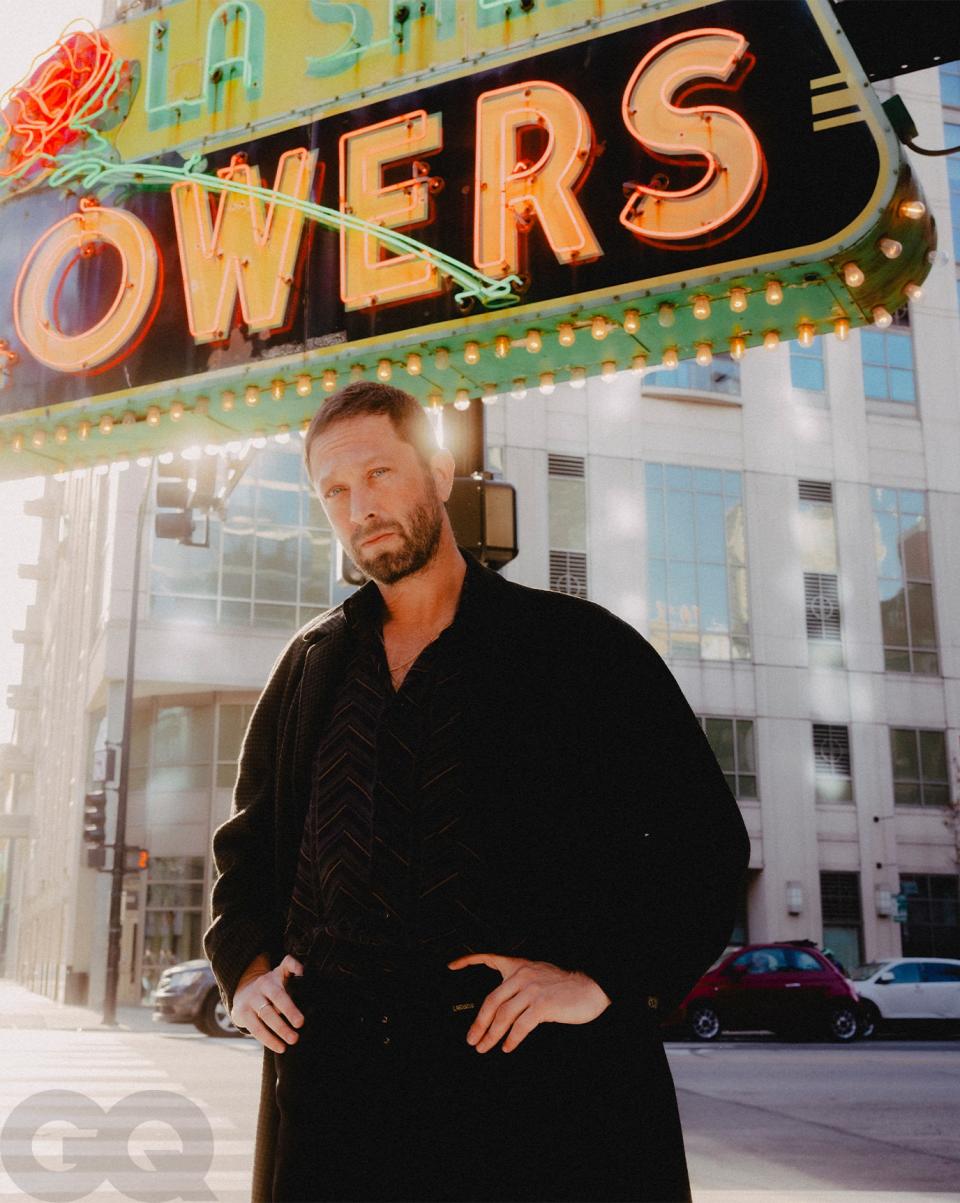
As we walk up crowded Atlantic Avenue, where luxe Cobble Hill turns into deluxe Brooklyn Heights, Moss-Bachrach’s hoodie is no longer covering his head. He’s on the go. New Yorkers are generally pretty good about not bothering people they recognize (or maybe they’re just too busy to notice). “I've always sort of done what I've wanted,” Moss-Bachrach tells me when I ask about his slow-and-steady-wins-the-race mentality—although he’s quick to point out that it’s not about winning, but working, and doing it on his terms. “I never moved to LA,” he says. “Always New York. I always stayed pretty involved in doing plays. I was here for a pretty exciting period of New York cinema. I always made enough money to get by. I didn't feel so strongly about getting rich and famous or anything. It's nice to be getting more recognition now, but I was never asking when it was going to be my turn.”
Most people I know in the acting business are going crazy just trying to land non-speaking roles on pilots that have zero chance of getting picked up; how was Moss-Bachrach able to just put his head down and work? I ask if that took a great deal of patience.
“No,” he tells me. We’re crossing into Dumbo—down under the Manhattan Bridge—and a train starts rumbling over our heads. He continues after it goes by. “It's not patience, because I was satisfied.”
That sounds like something somebody who has found success would say after the fact. But the more I talked with other people who know and have worked with Moss-Bachrach, I found that he’s always operated with the same mindset.
“I don't envy any actor in the world. I think it’s a really, really difficult thing to do, and it's a hard business. You're beholden to everyone else on earth, and you have very little control,” says Jenni Konner, who was first introduced to Moss-Bachrach when she was working as coproducer and co-showrunner of Girls. She could tell right away that he was a guy who got very invested in every character he played and didn’t have grand ambitions of fame. “He’s just a guy who shows up ready to do his job, and he really likes doing that job.”
Moss-Bachrach landed a role in the show’s third season as Desi Harperin, a musician whom Allison Williams’s Marnie marries and later divorces. Desi was initially meant to come and go within an episode or two, but Konner and Lena Dunham both ended up loving the character. On the page, Konner admits, Desi was “a little bit of a ridiculous cliché”—a central casting Brooklyn musician-artist fuckboi. “But Ebon brought so much invention to Desi. He’s truly one of the funniest people I’ve ever met, as funny as any comedy writer I’ve ever worked with, and he’s also really easy on the eyes. It was a little bit like finding a unicorn.”
Moss-Bachrach’s Girls run—he stuck around through the show’s sixth and final season—may have been the first time viewers started taking note of his talents. But among his fellow actors, Moss-Bachrach already had a reputation. “He auditioned for a movie I wrote years ago, and he was so fucking good,” the actor and writer Bob Odenkirk tells me. The movie never ended up getting made, but Odenkirk says he kept an eye on the young actor, curious to see what he was up to. “He’d be doing some theater stuff here and there,” Odenkirk says, “and not until Girls almost 20 years later did he get a part that let him show a bigger audience what he can do.”
Odenkirk would finally get to work with Moss-Bachrach in 2023, in “Fishes,” the most talked-about and chaotic episode of The Bear’s acclaimed second season, and the experience cemented his opinion on the actor he’d tried to cast years earlier: “I just really believe the guy is one of the best actors of our generation. I really believe that.”

Moss-Bachrach was born in New York City and returned there to attend Columbia in the mid-1990s. He spent the years in between in Amherst, Massachusetts; his father was an educator who founded and ran the Community Music School in nearby Springfield, his mother worked for the Big Brother Big Sister program. Over his career, Moss-Bachrach has kept a low enough profile that his Wikipedia page has him incorrectly pegged as a Massachusetts native, even though he was born at the NYU hospital on First Avenue and lived in the city until he was about four.
Despite his connections to the Marvel Cinematic Universe—he played Frank Castle’s sometime ally David Lieberman on Netflix’s The Punisher, and next summer he’ll be Ben Grimm, The Thing, in The Fantastic Four, a project so early days he can’t say another word about it—Moss-Bachrach wasn’t a comics kid growing up. His thing was sci-fi—Frank Herbert’s Dune, Dr. Who on the black-and-white TV set his parents rarely let him watch. This is something he has in common with Richie, who has name-dropped Philip K. Dick more than once on The Bear; Moss-Bachrach tells me he and the show’s creator, Christopher Storer, came up with those lines together, and Richie became a little more like Ebon. (Whether we’ll see Richie cop to loving Dungeons & Dragons, as Moss-Bachrach did, remains to be seen.)
We’ve hit the part of Williamsburg where Hasidim outnumber the gentrifiers. Moss-Bachrach has been acting casual this entire walk, not looking around to see if people notice him, never pulling out his phone even once. He mostly keeps his hands in his hoodie pockets; at one point he takes out a toothpick to chew on. We talk a little bit about the movies and plays he loved as a kid.
“I remember my grandma took me to see Pirates of Penzance once and I was trying to figure out where the pirates would come out from. Then there’s all this commotion on the stage and I heard a commotion behind me and they came out from the back of the house. I was just floored.” He also recalls seeing a magic show on Broadway in the 1980s that had a huge impact on him. In moments like those, he says, “the seeds were planted—but I don’t think it was any kind of cognizant realization, like, Oh, I want to do this.” That realization came later, in college, when he took an acting class out of curiosity. Moss-Bachrach has always been a very right-brained person. He played piano “pretty seriously” for a long time, and has always loved to draw, even to this day. But acting felt different. He started with what he now calls “cliché stuff”—scene work from Chekhov and Sam Shepard plays. But it wasn’t a solitary action the way drawing is, and Moss-Bachrach quickly began to understand how he could stretch out and make a scene that had been acted out a million times by countless other people into something different, the same way Glenn Gould found a way to add something to Bach’s music 200 years after the composer’s death.
Moss-Bachrach got a summer apprenticeship at the Williamstown Theater Festival when he was 19, and that’s when he had the moment. “I was around all this incredible theater and all these actors and directors, and that was when I felt indoctrinated,” he says. “I thought if I could make a life hanging out with these people, playing and building, creating and imagining, then I’ll do this as long as I possibly can.”
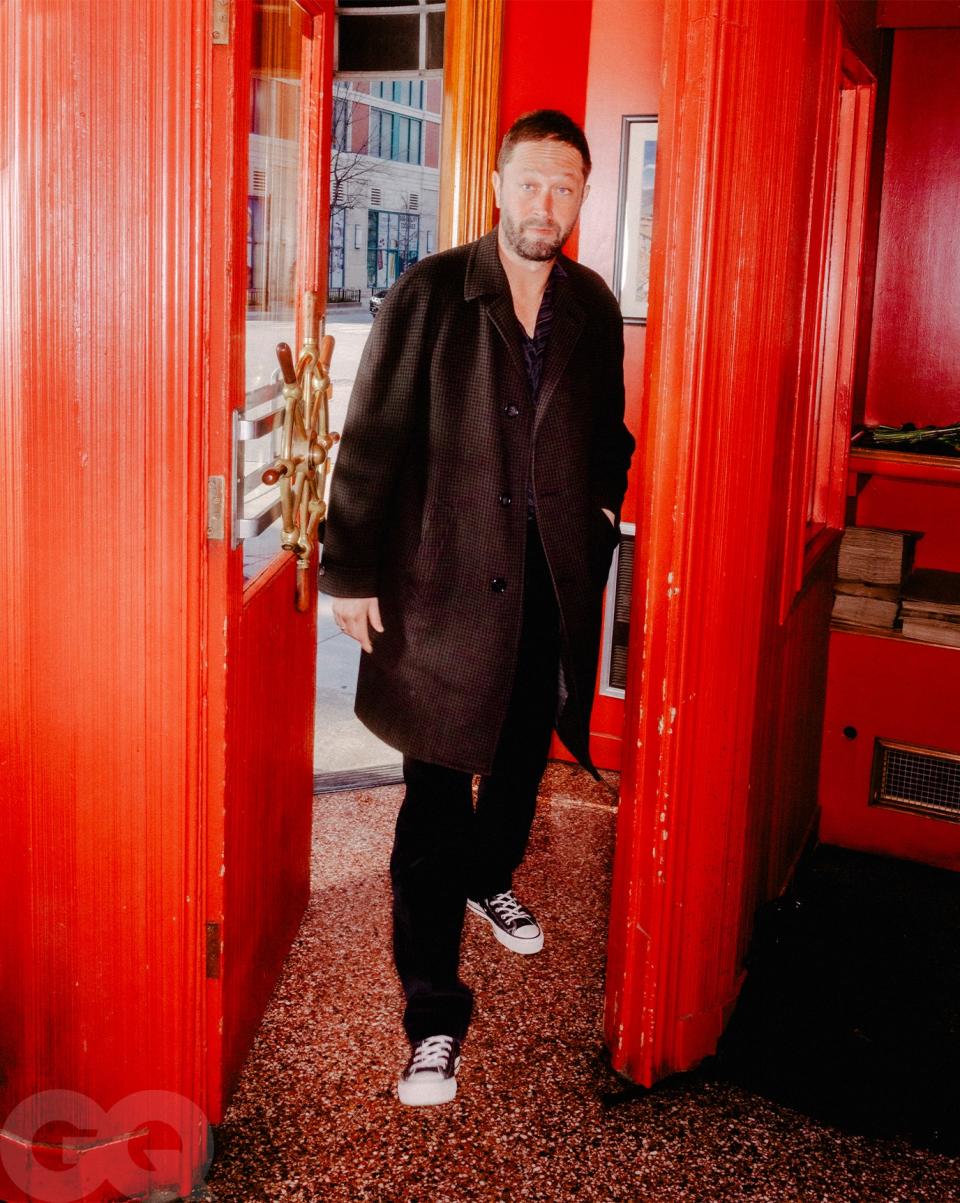
No matter how you look at it—whether you consider that summer apprenticeship or his first credited screen role as Billy in the 1999 A&E murder mystery, Murder in a Small Town, starring the late Gene Wilder, as the start of Moss-Bachrach’s journey as an actor—Moss-Bachrach followed through on his aspiration to do it as long as he could. When did it click for him that it was working? “It’s a vague sort of thing,” he says. “At what point are you allowed to say you’re an actor? I had bad years where I didn’t work much early on. There was a year when I worked one day. And I was like, Am I still allowed to call myself an actor?”
We’ve reached a stretch of Kent Avenue that used to be where people made things in factories, that eventually became places where people lived, that were eventually leveled to make way for the glass buildings that now tower over the street. Passersby start to notice who’s walking towards them. Some of them wave, and almost every single one of them smiles. One stops in front of us and says, “Hey, I love you,” to Moss-Bachrach, then high-fives him. Some of these people probably knew him from Girls, or maybe they were Star Wars fanatics stoked to have spotted the guy from Andor. But if I had to guess, the person who gave him five probably knew him from The Bear. The two that yelled “Cousin!” from across the street definitely did.
In the pilot script for The Bear, Richie Jerimovich (whose character name was originally the somehow-even-more-Chicago-guy-ish Richie Kalinowski) is described as follows: “40, ASSHOLE, BEEF T-SHIRT.” By the time Richie shows up in the finished pilot, about nine minutes in, we’ve already met Carmy, the anxious center of the story, and Ayo Edebiri’s Sydney, wide-eyed and hopeful, and many of the other kitchen staffers who make The Beef run. Richie walks in acting like he’s still the king of the castle—he calls Sydney “sweetheart” and accuses Carm of being “woke,” like he’s been waiting all week to use the word as an insult.
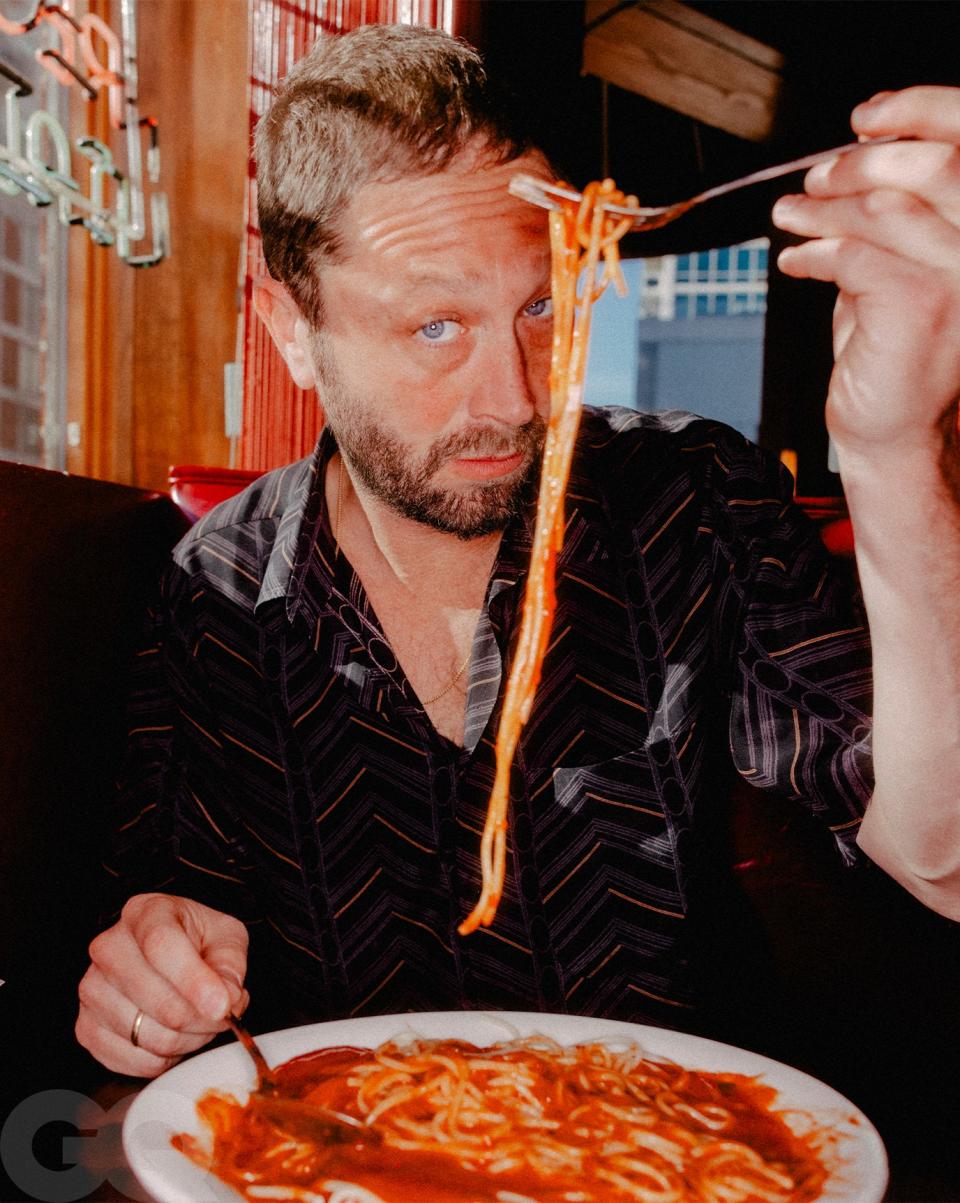
Once Carmy takes ownership of the restaurant, Richie is stripped of the power he once had as manager, and the demotion chafes; he’s miserable, and confused about his place in the new regime, and seems to respect no one except Cicero, Carmy’s shady South Side uncle, played by Oliver Platt. Throughout the first season and into the second, Richie’s a comic foil and a source of tension, but his arc as a character stayed vague. Well into season two, I kept wondering when or if we’d finally get to see Richie emerge. And then came “Forks,” that season’s perfect seventh episode, and the moment when I realized just how thoroughly and subtly Moss-Bachrach had taken ownership of the role.
“Richie starts out so damn crusty when we first see him [in “Forks”],” Platt says over the phone. “He’s feeling slighted and underappreciated and very What the fuck am I doing here, but then he ends up being the man. He runs down the street to get a family the deep dish pizza because he’s listening and he’s growing. I’ve thought a lot about the arc of the character, and Richie’s story is like a novel. He’s the biggest, crustiest naysayer who has no purpose in life, he’s telling [Allen White’s] Carm, This is my house, get out of my house, but then goes from that to—organically—to earn it. And let’s face it: Most of it happens in that episode.”
“Forks” opens with the voice of legendary college basketball coach Mike Krzyzewski talking about being able to change, working with a team, and becoming a leader. When we see Richie for the first time he’s dragging himself out of bed at 5:38 in the morning, throwing water on his face, lighting a cigarette in the car, every movement somehow communicating defeat. When he rolls up to Ever, a real-life two-Michelin-star restaurant, he mutters, “Fuck you, Cousin”—he’s 40-something, and he’s about to clock in for the first of seven purgatorial days he’ll spend polishing forks in the back of the house. At first he sees it as a punishment—from Carmy, and from the world, especially after he calls his ex-wife (Gillian Jacobs) and she tells him she’s engaged. But in the course of the episode, Richie achieves some kind of transcendence; he comes to understand not only the satisfaction of getting the details right but the fulfillment to be found in serving other people.
There’s a plaque on the wall at Ever, a reminder to the team that “Every second counts.” By the end of the episode, Richie has learned where the phrase comes from but also what it means. Moss-Bachrach seems to know; he’s never taken a moment of his time as an actor for granted. But there’s another parallel that sticks out for me when I think about “Forks.” Moss-Bachrach, who’s contentedly worked his ass off for years even when the accolades and big-money parts weren’t there, finally won an Emmy for playing a guy with a chip on his shoulder about what he hasn’t achieved. I believe Moss-Bachrach when he tells me he’s always been satisfied with what’s come his way, even before The Bear, and the Emmy, and the Marvel of it all. I just can’t figure out what he tapped into to play it the other way.
“Listen, I'm an old freaking hack,” Platt jokes when I tell him how much “Forks” moved me. “But it's so great to see somebody, all of a sudden—in other people's eyes, anyway—come into their own in their 40s. You’ve got to love stories like that.” A minute or two later, after we’ve hung up, I realize I don’t know if he was talking about Richie or Ebon.
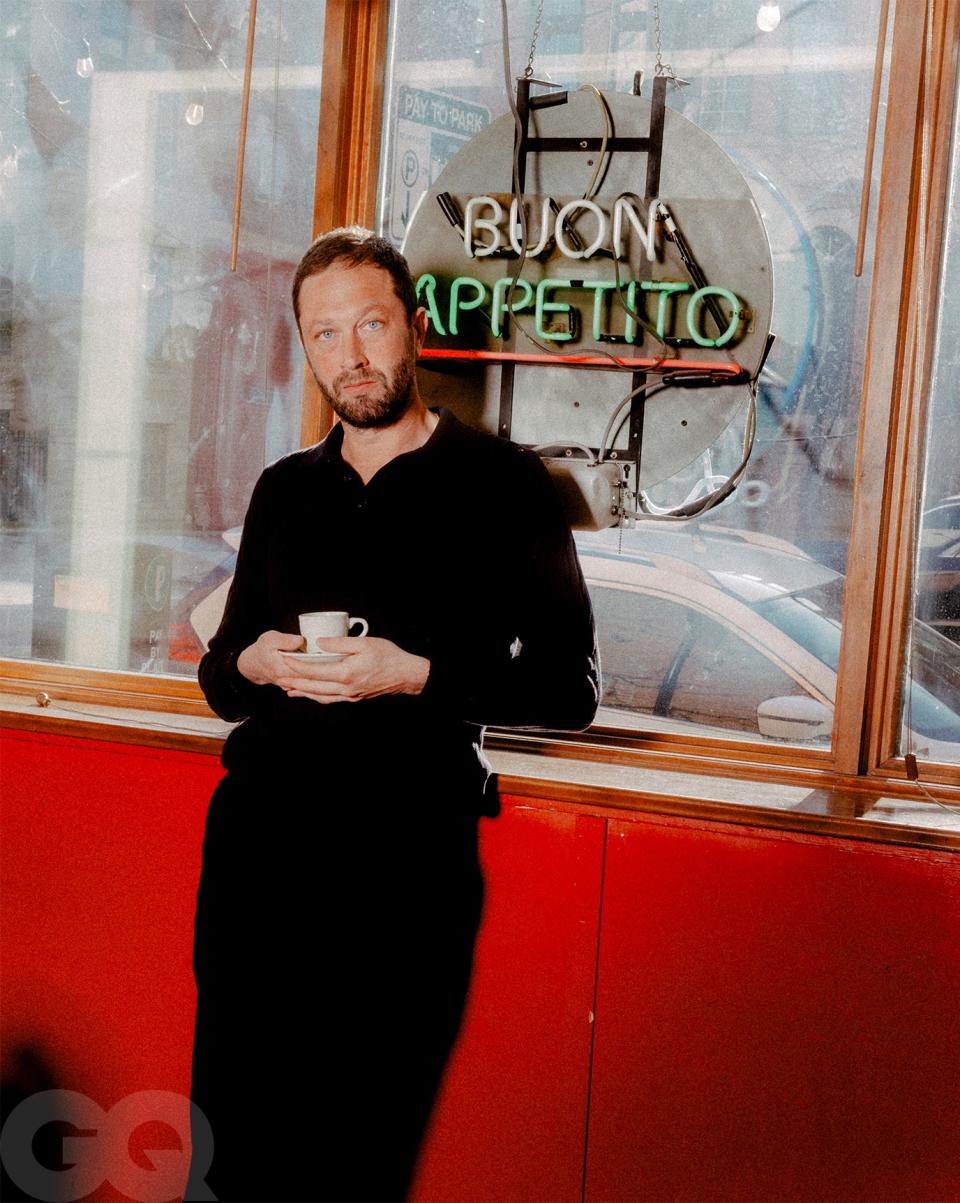
What satisfies Ebon? That’s the question I’m getting ready to ask him when we stop in the shadow of the Williamsburg Bridge. He points to a small apartment building, the sort of structure that is slowly going extinct in this neighborhood.
Moss-Bachrach and his wife, the photographer Yelena Yemchuk, lived there until about 2007. “That’s where we had our first kid,” he says. “It was a strange kind of formation, where you kept going through one room to another, then another, and another. We were on the top floor.”
He looks up at the building and neither of us says anything for a beat. A couple walks past us and says hello; Moss-Bachrach smiles and returns the greeting as if they’re old acquaintances. He says he’d never seen them before, and that that’s just how he is with everybody. “I don’t think it behooves somebody that has my job to not engage with people. I live in this amazing city and I want to experience it,” he says, before turning his attention back to the old apartment and the life he lived there.
“I had my first kid when I was 28 or 29,” Moss-Bachrach says. That was Sasha, born in 2006; another daughter, Mirabelle, followed in 2010. “So in my 30s, when it’s supposed to be all career, career, career, it wasn’t, for me. I think that perspective really helps,” he says. “I was providing for my family and was around. It was the joy of discovery, of fatherhood, and being around my little girls.”
We talk for a minute or two longer. Then Moss-Bachrach goes one way, to get his bike, and I go the other. But before we part, I ask—still hoping he’ll cop to there being a little bit of Richie in him—if he’s grown close to his Bear character. He admits that he has. “But when the job is done,” he says, “I’ll mourn the loss of working with the people I work with, in this very sort of ideal, beautiful work environment. I hope I’m not taking Richie on a tour, like hitting Branson, Missouri, on the Bear Bus Experience.”
Some people take a while to figure out who they’re going to be—like me, hanging out in that park all those years ago, thinking I was Johnny Thunders by association. Moss-Bachrach seems like he’s always just known. The work was what mattered back when he lived up in that top-floor apartment, starting his family, and the work is what matters now, and it will as long as people keep asking him to do it. His future career prospects are undoubtedly better than they were back then, but that’s never been what it’s about.
“Now I get more things sent to me, and I have more of a chance to choose parts I want, but I always felt good about what I was doing and the place I was at. I’m good at being in the moment,” he told me. “The moment is all we have.”
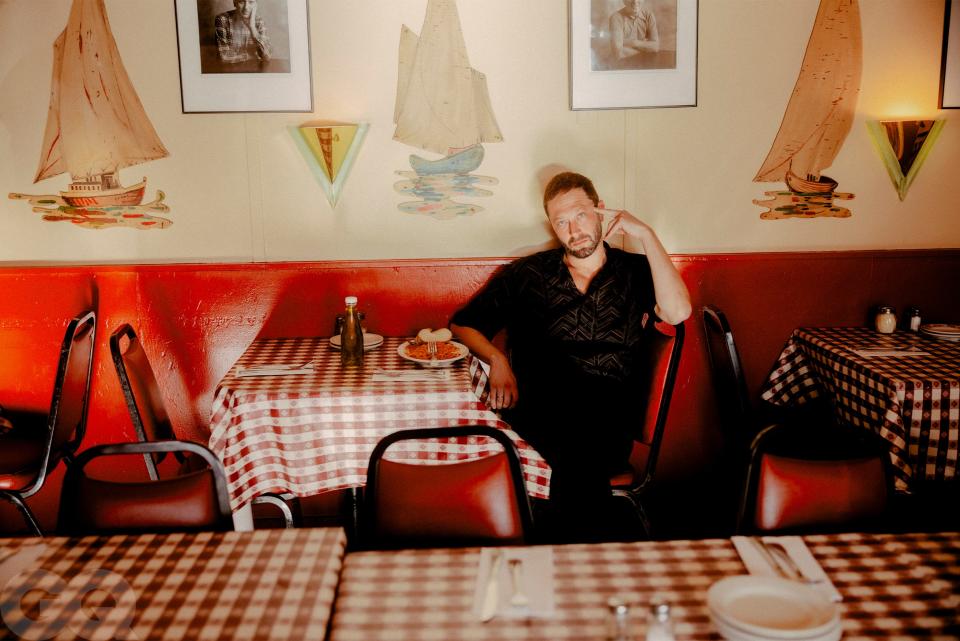
PRODUCTION CREDITS:
Photographs by Evan Jenkins
Grooming by Erica Martens
Special thanks to Club Lago Restaurant & Lounge
Originally Appeared on GQ

